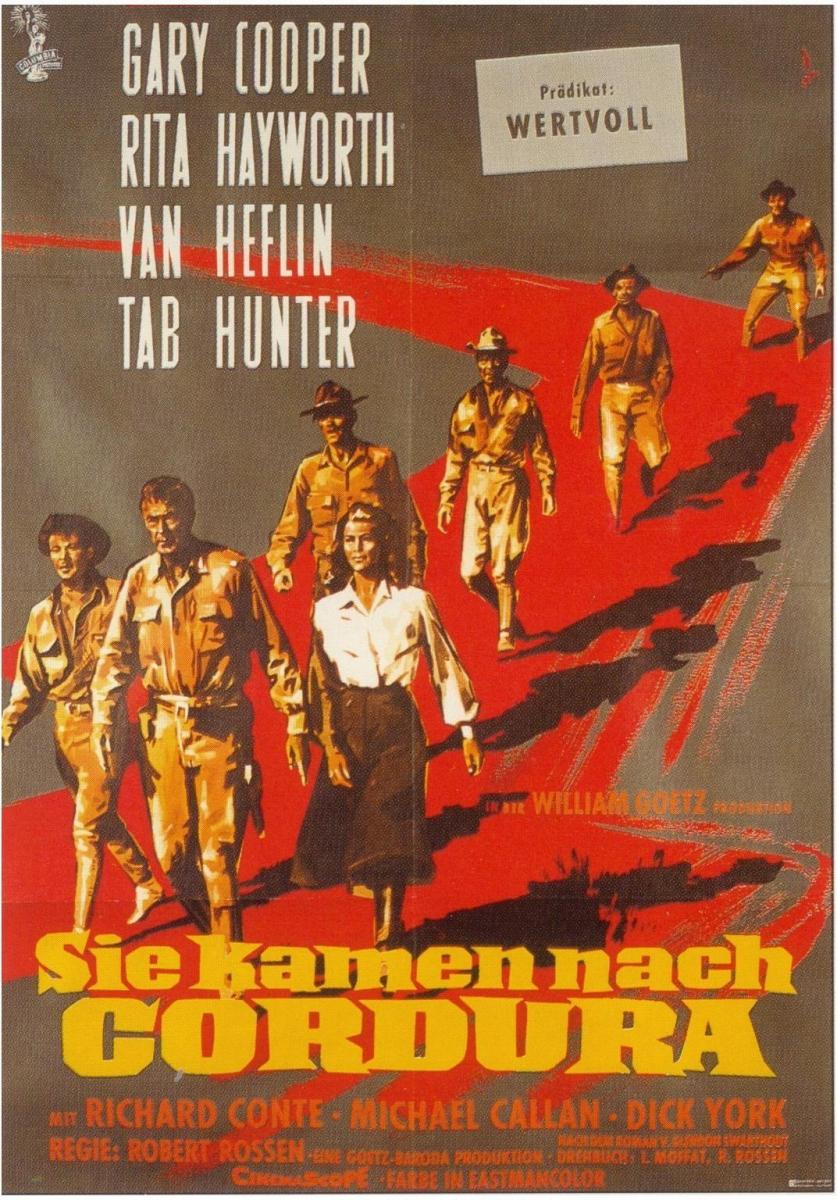I have to agree that this is a film that is not as good as it should be. Robert Rossen is a fine director ("All The King's Men", "Alexander The Great", "The Hustler"), but he is not a popular one. His films do tackle weighty themes and characters, but too frequently he gets talky and loses his audience. Such a thing happens in "They Came To Cordura", where the theme of what is courage is overdeveloped. From what one of the earlier comments on this thread suggested Rossen's movie was half an hour longer than it is. Since many viewers lose their interest in the film at it's current length, why would a longer version improve matters?
In 1916, while World War I was occupying most people's attention, President Wilson was concerned with the continuous unsettled state of Mexico, then in the sixth year of it's Revolution. Initially he was delighted with the first head of the Revolution, Francisco Madero, who was trying to make the country a nation ruled by constitutional law. But in 1913, Madero was overthrown and murdered by the head of the Mexican army, General Huerta. Huerta had support by the then Ambassador to Mexico, a gentleman named Henry Wilson (no relation to the then President-elect), who openly cooperated in the assassination. After Woodrow Wilson was inaugurated, he replaced Henry, but the damage was done to Mexican-American relations. The new President was too ham handed to improve matters. In 1914 he had the Marines land at Vera Cruz after our flag had been insulted. Many lives were lost in this battle. Wilson worked to force Huerta out of his office. This brought him into considering someone to replace Huerta.
Why a puritanical prude like Woodrow Wilson thought of supporting Francisco "Pancho" Villa as the corrective to Huerta has never been adequately explained. Although the two men never met, it is inconceivable that Wilson would have found the hard drinking, bloody minded, and woman chasing Pancho as an ideal type to run Mexico. But he did, and for a year or so (until Huerta left Mexico) Villa was given arms and supplies from the U.S. This honeymoon lasted until a new figure arose - General Venusiano Carranza. Carranza (like Madero) wanted the adoption of a permanent national constitution to run the country. Wilson liked this (he did not notice that Carranza did not hesitate to feather his own nest while stressing the constitution. So in 1916 Wilson began aiding Carranza, and slowly ceased assisting Villa.
Villa was angered by this, and decided to teach the gringos a lesson. He raided the town of Columbus, New Mexico, killing about a dozen citizens. It was the first foreign invasion of American soil since the War of 1812, and would be the only invasion of the continental territory of the U.S. between 1814 and 09/11/2001. Wilson was furious, and demanded that President Carranza arrest the bandit/revolutionary. Wilson might as well have demanded that Carranza arrest the winds of Mexico. He had fought several battle against Villa, and knew that Pancho was no pushover. When Carranza gave some half-baked reason for not catching Pancho, Wilson decided to take the matter into his own hands: he sent troops into Mexico under General John J. Pershing to catch the bandit revolutionary. For a year or so Pershing tried to catch Villa, but the wily Pancho managed to keep escaping. Finally the U.S. troops were called back. Mexicans were incensed at American arrogance in invading their country (sound familiar?). The only good thing was that it enabled us to test our army out here, under if's future Expeditionary Commander's leadership, before we went into the European conflict.
Except, possibly, "The Three Amigos", this is the only commercially made film that is set in the Anti - Villa expedition of 1916 - 1917. As such it barely touches the reasons for the expedition. Instead it concentrates on Gary Cooper's assignment to find five men who should receive the U.S. Medal of Honor for gallantry and bravery in action. It is a cynical act by Washington, because 1) the purpose is public relations cosmetics for a botched armed intervention; and 2) Cooper's Major Thorn is actually given the assignment because he acted cowardly on the field of battle. For the Major to be given this quiet assignment is actual an insult - his own courage is being questioned.
Soon he finds a battle going on and picks out his five men (Van Heflin, Richard Conte, Michael Callan, Tab Hunter, and Dick York). This gives him some problems with an old friend, Robert Keith, who planned the attack, and hoped it would lead to him getting the award (actually, Cooper was only impressed at how slapdash and badly planned the attack was, and cannot think of it's architect getting any type of award as a result). Keith ends his friendship with Cooper as a result.
Taking his five men with him, Cooper starts trying to get to know them. He soon discovers that the men are not interested in the medal, and (as they have a long trek to Cordura, where they have to go to finalize the awards), Cooper learns that the men are not very noble at all. To worsen things, they capture a hacienda owner who is American (Rita Hayworth), who gave assistance to Villa's men. The woman reawakens sexual tensions and rivalries between the five men, as well as Cooper.
The film ends with Cooper and the men coming to turns (after several nearly deadly confrontations) with their own views of the values of true courage and it's being honored. It is not a dull matter, but one questions a full two hour about it. Because of the covering of this dismal incident of the diplomatic history of the U.S. and Mexico, and the acting (all the leads are good), and Rossen's direction - it is worth a "7" out of "10".
In 1916, while World War I was occupying most people's attention, President Wilson was concerned with the continuous unsettled state of Mexico, then in the sixth year of it's Revolution. Initially he was delighted with the first head of the Revolution, Francisco Madero, who was trying to make the country a nation ruled by constitutional law. But in 1913, Madero was overthrown and murdered by the head of the Mexican army, General Huerta. Huerta had support by the then Ambassador to Mexico, a gentleman named Henry Wilson (no relation to the then President-elect), who openly cooperated in the assassination. After Woodrow Wilson was inaugurated, he replaced Henry, but the damage was done to Mexican-American relations. The new President was too ham handed to improve matters. In 1914 he had the Marines land at Vera Cruz after our flag had been insulted. Many lives were lost in this battle. Wilson worked to force Huerta out of his office. This brought him into considering someone to replace Huerta.
Why a puritanical prude like Woodrow Wilson thought of supporting Francisco "Pancho" Villa as the corrective to Huerta has never been adequately explained. Although the two men never met, it is inconceivable that Wilson would have found the hard drinking, bloody minded, and woman chasing Pancho as an ideal type to run Mexico. But he did, and for a year or so (until Huerta left Mexico) Villa was given arms and supplies from the U.S. This honeymoon lasted until a new figure arose - General Venusiano Carranza. Carranza (like Madero) wanted the adoption of a permanent national constitution to run the country. Wilson liked this (he did not notice that Carranza did not hesitate to feather his own nest while stressing the constitution. So in 1916 Wilson began aiding Carranza, and slowly ceased assisting Villa.
Villa was angered by this, and decided to teach the gringos a lesson. He raided the town of Columbus, New Mexico, killing about a dozen citizens. It was the first foreign invasion of American soil since the War of 1812, and would be the only invasion of the continental territory of the U.S. between 1814 and 09/11/2001. Wilson was furious, and demanded that President Carranza arrest the bandit/revolutionary. Wilson might as well have demanded that Carranza arrest the winds of Mexico. He had fought several battle against Villa, and knew that Pancho was no pushover. When Carranza gave some half-baked reason for not catching Pancho, Wilson decided to take the matter into his own hands: he sent troops into Mexico under General John J. Pershing to catch the bandit revolutionary. For a year or so Pershing tried to catch Villa, but the wily Pancho managed to keep escaping. Finally the U.S. troops were called back. Mexicans were incensed at American arrogance in invading their country (sound familiar?). The only good thing was that it enabled us to test our army out here, under if's future Expeditionary Commander's leadership, before we went into the European conflict.
Except, possibly, "The Three Amigos", this is the only commercially made film that is set in the Anti - Villa expedition of 1916 - 1917. As such it barely touches the reasons for the expedition. Instead it concentrates on Gary Cooper's assignment to find five men who should receive the U.S. Medal of Honor for gallantry and bravery in action. It is a cynical act by Washington, because 1) the purpose is public relations cosmetics for a botched armed intervention; and 2) Cooper's Major Thorn is actually given the assignment because he acted cowardly on the field of battle. For the Major to be given this quiet assignment is actual an insult - his own courage is being questioned.
Soon he finds a battle going on and picks out his five men (Van Heflin, Richard Conte, Michael Callan, Tab Hunter, and Dick York). This gives him some problems with an old friend, Robert Keith, who planned the attack, and hoped it would lead to him getting the award (actually, Cooper was only impressed at how slapdash and badly planned the attack was, and cannot think of it's architect getting any type of award as a result). Keith ends his friendship with Cooper as a result.
Taking his five men with him, Cooper starts trying to get to know them. He soon discovers that the men are not interested in the medal, and (as they have a long trek to Cordura, where they have to go to finalize the awards), Cooper learns that the men are not very noble at all. To worsen things, they capture a hacienda owner who is American (Rita Hayworth), who gave assistance to Villa's men. The woman reawakens sexual tensions and rivalries between the five men, as well as Cooper.
The film ends with Cooper and the men coming to turns (after several nearly deadly confrontations) with their own views of the values of true courage and it's being honored. It is not a dull matter, but one questions a full two hour about it. Because of the covering of this dismal incident of the diplomatic history of the U.S. and Mexico, and the acting (all the leads are good), and Rossen's direction - it is worth a "7" out of "10".













































No comments:
Post a Comment